Rob Bignell's Blog, page 373
May 5, 2013
Book now at Bookends on Main in Menomonie
My latest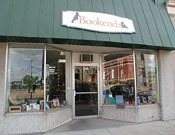 book, Headin’ to the Cabin: Day Hiking Trails of Northwest Wisconsin, is now on sale at the Bookends on Main bookstore in downtown Menomonie, Wis. Entering its seventh year in business, the bookstore devotes two shelves to local authors. Day Hiking Trails of Northwest Wisconsin describes a 100-plus day hiking trails in the Wisconsin counties of Ashland, Barron, Bayfield, Burnett, Douglas, Polk, St. Croix, Sawyer and Washburn. Bookends on Main is located at 214 E. Main St.
book, Headin’ to the Cabin: Day Hiking Trails of Northwest Wisconsin, is now on sale at the Bookends on Main bookstore in downtown Menomonie, Wis. Entering its seventh year in business, the bookstore devotes two shelves to local authors. Day Hiking Trails of Northwest Wisconsin describes a 100-plus day hiking trails in the Wisconsin counties of Ashland, Barron, Bayfield, Burnett, Douglas, Polk, St. Croix, Sawyer and Washburn. Bookends on Main is located at 214 E. Main St.
Need an editor? Having your book, business document or academic paper proofread or edited before submitting it can prove invaluable. In an economic climate where you face heavy competition, your writing needs a second eye to give you the edge. I can provide that second eye.
Related articles
 Updated version of 'Hikes with Tykes' released
Updated version of 'Hikes with Tykes' released Editor's latest book now out in paperback
Editor's latest book now out in paperback Editor's latest hiking guidebook now out
Editor's latest hiking guidebook now out Editor releases first "Hittin' the Trail" guidebook
Editor releases first "Hittin' the Trail" guidebook Book now for sale at Volume One bookstore
Book now for sale at Volume One bookstore
May 4, 2013
How to overcome annoying writer’s block
Finally you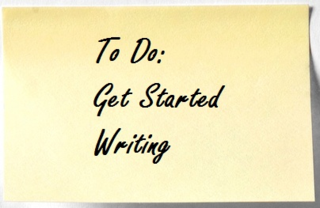 have time to yourself to write – work is over, the kids are away, all homework is turned in – and you sit down before the laptop with a steaming cup of coffee, all ready to write the next Great American Novel.
have time to yourself to write – work is over, the kids are away, all homework is turned in – and you sit down before the laptop with a steaming cup of coffee, all ready to write the next Great American Novel.
But nothing comes.
You take a sip of coffee. The mug warms your hands.
Still nothing comes.
You take a long stretch, crack your knuckles, bring your fingers to the keyboard.
But nothing still comes.
You’ve got writer’s block.
As Presley Thurman, the main character in the mystery novel “Necklaces and Nooses” says, “I had all these great ideas, plot lines, fun characters, but I just couldn’t seem to do anything but stare at the blank page when I tried to get it down on paper or computer screen. I had a problem getting it from my head to paper, which was a big obstacle for someone who wanted to be a writer.”
Unfortunately, the longer you allow writer’s block to continue, the less you’ll have written – and the harder it will be to overcome. Don’t fret, however: Almost every writer suffers from it every once in a while.
Fortunately, there are a lot of things you can do to create the right environment for you to end your writer’s block. Here are some methods used by writers that I’ve edited:
g Play music that will get you into the mood – Heavy metal or industrial works if writing cyberpunk, classical if writing about a moment of triumph, Simon and Garfunkel if your character is in a reflective mood.
g Create a “playlist” for your characters and story – Select songs that help you get into your character’s frame of mind of the scene’s tone. Then play those songs as you write.
g Add something that demands explanation – One writer told me he imitated Raymond Chandler’s approach. When Chandler had writer’s block, he would introduce a man with a gun, which then forced him to figure out who the man with the gun might be and what he wanted given what already had been written.
g Conduct a mock interview with your character – Perhaps your character’s background and their motivations need to be further developed for you to continue the story. An interview will help you further develop the character.
g Share your writing with someone – Make sure this person has the caliber to offer suggestions and feedback that spurs your creativity.
g Allow yourself to write “poorly” – Most writer’s block is caused by fear that you lack talent. Simply start writing and edit the junk out later.
You also might set story aside and come back to it in a few days. In the meantime, read stories or nonfiction works about your setting or in the genre that you’re writing, and see if that sparks your creativity. This doesn’t immediately solve your writer’s block, but it may help in the long run. Often I find “research” about elements of my story spurs new ideas about what to write.
Finally, be honest about what you’re writing. Perhaps the reason you can’t think of what to write next is that the story is flawed: the plot is illogical, the main character lacks an internal conflict, it’s being told from the wring point of view. In that case, rewrite, start over, or abandon it. Then get to penning a story that works!
After you pour yourself another cup of coffee, of course.
Need an editor? Having your book, business document or academic paper proofread or edited before submitting it can prove invaluable. In an economic climate where you face heavy competition, your writing needs a second eye to give you the edge. I can provide that second eye.
Related articles
 Avoid exposition (Show, don't tell!)
Avoid exposition (Show, don't tell!) Five Great Quotations for Aspiring Writers
Five Great Quotations for Aspiring Writers
May 3, 2013
Book now for sale at Chapter 2 bookstore
My latest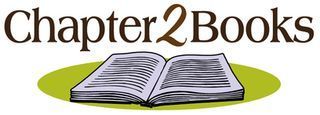
book, Headin’ to the Cabin: Day Hiking Trails of Northwest Wisconsin, is now on sale at the Chapter 2 bookstore in downtown Hudson, Wis. Closing on its second year in business, Chapter 2 stocks a full range of quality books and boasts an excellent children’s section. Day Hiking Trails of Northwest Wisconsin describes a 100-plus day hiking trails in the Wisconsin counties of Ashland, Barron, Bayfield, Burnett, Douglas, Polk, St. Croix, Sawyer and Washburn. Chapter 2 is located at 422 Second St.
Need an editor? Having your book, business document or academic paper proofread or edited before submitting it can prove invaluable. In an economic climate where you face heavy competition, your writing needs a second eye to give you the edge. I can provide that second eye.
Related articles
 Editor's latest hiking guidebook now out
Editor's latest hiking guidebook now out Editor's latest book now out in paperback
Editor's latest book now out in paperback Editor releases first "Hittin' the Trail" guidebook
Editor releases first "Hittin' the Trail" guidebook Updated version of 'Hikes with Tykes' released
Updated version of 'Hikes with Tykes' released Market your book by wearing your book title
Market your book by wearing your book title
May 2, 2013
Editing client releases first novel, 'Dog Island'
A recent 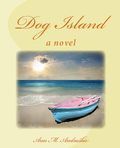 editing client of mine, Ann M. Andrashie, published her first novel this past week, “Dog Island”. When 12-year-old Katherine Rose “Mosie” Bitmen’s family moves to Bayfield, Wis., she forges a friendship with a dog that’s gone wild in the swamps. To save the dog’s life and that of her soon to be born wolf-pups, Mosie has to make a decision of a lifetime: to seek out the legendary Dog Island located next to the Apostle Islands, somewhere out in the cold deep waters of Lake Superior. The book is available for purchase online.
editing client of mine, Ann M. Andrashie, published her first novel this past week, “Dog Island”. When 12-year-old Katherine Rose “Mosie” Bitmen’s family moves to Bayfield, Wis., she forges a friendship with a dog that’s gone wild in the swamps. To save the dog’s life and that of her soon to be born wolf-pups, Mosie has to make a decision of a lifetime: to seek out the legendary Dog Island located next to the Apostle Islands, somewhere out in the cold deep waters of Lake Superior. The book is available for purchase online.
Need an editor? Having your book, business document or academic paper proofread or edited before submitting it can prove invaluable. In an economic climate where you face heavy competition, your writing needs a second eye to give you the edge. I can provide that second eye.
Related articles
 Editing client releases quest novel sequel
Editing client releases quest novel sequel Editing client releases first children's book
Editing client releases first children's book Hawaiian editing clients release first book
Hawaiian editing clients release first book Client releases second book, 'Uncommon Wisdom'
Client releases second book, 'Uncommon Wisdom' Editing client publisher first gangster novel
Editing client publisher first gangster novel
May 1, 2013
Book now for sale at Volume One bookstore
My latest
book, Headin’ to the Cabin: Day Hiking Trails of Northwest Wisconsin, is now on sale at the Volume One store in downtown Eau Claire, Wis. The offices for Volume One Magazine, the biweekly arts and entertainment guide for the Chippewa Valley, carries all things “Eau Claire” at its Local Store. Day Hiking Trails of Northwest Wisconsin describes a 100-plus day hiking trails in the Wisconsin counties of Ashland, Barron, Bayfield, Burnett, Douglas, Polk, St. Croix, Sawyer and Washburn. Volume One’s Local Store is located at 205 N. Dewey St.
Need an editor? Having your book, business document or academic paper proofread or edited before submitting it can prove invaluable. In an economic climate where you face heavy competition, your writing needs a second eye to give you the edge. I can provide that second eye.
Related articles
 Editor's latest hiking guidebook now out
Editor's latest hiking guidebook now out Editor's latest book now out in paperback
Editor's latest book now out in paperback Updated version of 'Hikes with Tykes' released
Updated version of 'Hikes with Tykes' released Market your book by wearing your book title
Market your book by wearing your book title
April 30, 2013
Updated version of ‘Games and Activities’ out
An updated 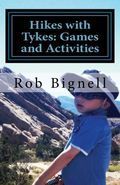 version of my book “Hikes with Tykes: Games and Activities” was released this past weekend in paperback and on Kindle. Both versions contain additional games and activities from the July 2012 edition while the ebook includes working website links and a table of contents hyperlinked to sections in the book. Listing more than 100 diversions, “Games and Activities” provides anyone taking kids on a day hike with loads of tried and true amusements to keep children from getting unruly or bored. The updated version of the book can be purchased online.
version of my book “Hikes with Tykes: Games and Activities” was released this past weekend in paperback and on Kindle. Both versions contain additional games and activities from the July 2012 edition while the ebook includes working website links and a table of contents hyperlinked to sections in the book. Listing more than 100 diversions, “Games and Activities” provides anyone taking kids on a day hike with loads of tried and true amusements to keep children from getting unruly or bored. The updated version of the book can be purchased online.
Need an editor? Having your book, business document or academic paper proofread or edited before submitting it can prove invaluable. In an economic climate where you face heavy competition, your writing needs a second eye to give you the edge. I can provide that second eye.
Related articles
 Editor's latest book now out in paperback
Editor's latest book now out in paperback Editor's latest hiking guidebook now out
Editor's latest hiking guidebook now out Market your book by wearing your book title
Market your book by wearing your book title Editing client releases quest novel sequel
Editing client releases quest novel sequel
April 29, 2013
Editor releases first “Hittin’ the Trail” guidebook
The first  title in my new hiking ebook series, Hittin’ the Trail, went on sale this weekend. The debut guidebook is Day Hiking Trails of Wisconsin and Minnesota Interstate State Parks. Each Hittin’ the Trail title focuses on a popular park, county or metro area and lets readers via their ereader:
title in my new hiking ebook series, Hittin’ the Trail, went on sale this weekend. The debut guidebook is Day Hiking Trails of Wisconsin and Minnesota Interstate State Parks. Each Hittin’ the Trail title focuses on a popular park, county or metro area and lets readers via their ereader:
g Plan a day of fun, family-friendly activities
g Reserve a campsite
g Receive a current list of planned events at the park or area
g Identify great trails perfect for a day hike
g Learn about special kid programs at the park or area
The debut title hit the top 20 Sunday morning for Amazon.com’s Hiking and Camping books. It’s available for sale on Kindle, Nook, iBook, Kobe, Sony Reader and other ereader formats.
Need an editor? Having your book, business document or academic paper proofread or edited before submitting it can prove invaluable. In an economic climate where you face heavy competition, your writing needs a second eye to give you the edge. I can provide that second eye.
Related articles
 Editor's latest book now out in paperback
Editor's latest book now out in paperback Updated version of 'Hikes with Tykes' released
Updated version of 'Hikes with Tykes' released Editor's latest hiking guidebook now out
Editor's latest hiking guidebook now out Market your book by wearing your book title
Market your book by wearing your book title
April 28, 2013
Updated version of ‘Hikes with Tykes’ released
A new 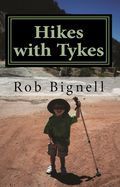 edition of my book Hikes with Tykes: A Practical Guide to Day Hiking with Kids was released this past week in paperback and on Kindle. Both versions update some of the tips and advice made in the July 2011 edition while the ebook includes working website links and a table of contents hyperlinked to sections in the book. Comprehensive and conversational, this book combines hiking parents' experiences, step-by-step how-to’s, and practical guidelines to help you plan the perfect day hike with your children. The updated version of the book can be purchased online.
edition of my book Hikes with Tykes: A Practical Guide to Day Hiking with Kids was released this past week in paperback and on Kindle. Both versions update some of the tips and advice made in the July 2011 edition while the ebook includes working website links and a table of contents hyperlinked to sections in the book. Comprehensive and conversational, this book combines hiking parents' experiences, step-by-step how-to’s, and practical guidelines to help you plan the perfect day hike with your children. The updated version of the book can be purchased online.
Need an editor? Having your book, business document or academic paper proofread or edited before submitting it can prove invaluable. In an economic climate where you face heavy competition, your writing needs a second eye to give you the edge. I can provide that second eye.
Related articles
 Editor's latest book now out in paperback
Editor's latest book now out in paperback Editor's latest hiking guidebook now out
Editor's latest hiking guidebook now out Market your book by wearing your book title
Market your book by wearing your book title
April 27, 2013
Client releases second book, ‘Uncommon Wisdom’
An editing client of mine, Thomas Whittingslow, has published his second book, “Uncommon Wisdom: The Inspiring Lessons of 12 Extraordinary People.” The book tells the stories of twelve extraordinary people – among them a Nobel Prize winner, a 107-year old Navajo grandmother, and a man who lived connected to an artificial heart machine for two years – who share the inspiring lessons they’ve learned on their journey through life. “Uncommon Wisdom” touches upon such wide-ranging topics as: the purpose of life; artistic breakthroughs; success; personal growth; courage under pressure; confronting death; overcoming racial and gender barriers; foundations for a fulfilling life; business strategies from a CEO; breaking social barriers; caretaking ethics; and spirituality. It is available online in paperback.
client of mine, Thomas Whittingslow, has published his second book, “Uncommon Wisdom: The Inspiring Lessons of 12 Extraordinary People.” The book tells the stories of twelve extraordinary people – among them a Nobel Prize winner, a 107-year old Navajo grandmother, and a man who lived connected to an artificial heart machine for two years – who share the inspiring lessons they’ve learned on their journey through life. “Uncommon Wisdom” touches upon such wide-ranging topics as: the purpose of life; artistic breakthroughs; success; personal growth; courage under pressure; confronting death; overcoming racial and gender barriers; foundations for a fulfilling life; business strategies from a CEO; breaking social barriers; caretaking ethics; and spirituality. It is available online in paperback.
Need an editor? Having your book, business document or academic paper proofread or edited before submitting it can prove invaluable. In an economic climate where you face heavy competition, your writing needs a second eye to give you the edge. I can provide that second eye.
Related articles
 Editing client releases first children's book
Editing client releases first children's book Editing client releases quest novel sequel
Editing client releases quest novel sequel
April 26, 2013
Editing client releases quest novel sequel
An editing 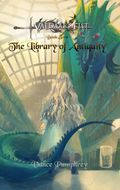 client of mine, Vance Pumphrey, has published his second novel, “The Library of Antiquity.” It’s the second book in his fantasy quest series, Valdaar’s Fist. The series traces the adventures of an unlikely band of heroes searching for a legendary sword (the aforementioned Valdaar’s Fist). In the latest book, they face their greatest challenge yet – coming up with ever-changing, counterintuitive solutions to the complex puzzles of the mysterious Library of Antiquity. Surviving the maddening maze only leads them to a fierce dragon bent on ending their quest. Currently the book is available on Kindle, Nook, iBook, and Sony Reader with a paperback due out within a few days.
client of mine, Vance Pumphrey, has published his second novel, “The Library of Antiquity.” It’s the second book in his fantasy quest series, Valdaar’s Fist. The series traces the adventures of an unlikely band of heroes searching for a legendary sword (the aforementioned Valdaar’s Fist). In the latest book, they face their greatest challenge yet – coming up with ever-changing, counterintuitive solutions to the complex puzzles of the mysterious Library of Antiquity. Surviving the maddening maze only leads them to a fierce dragon bent on ending their quest. Currently the book is available on Kindle, Nook, iBook, and Sony Reader with a paperback due out within a few days.
Need an editor? Having your book, business document or academic paper proofread or edited before submitting it can prove invaluable. In an economic climate where you face heavy competition, your writing needs a second eye to give you the edge. I can provide that second eye.
Related articles
 Editing client releases first children's book
Editing client releases first children's book Hawaiian editing clients release first book
Hawaiian editing clients release first book Editing client publisher first gangster novel
Editing client publisher first gangster novel Editor's latest book now out in paperback
Editor's latest book now out in paperback Editing client releases sequel to thriller
Editing client releases sequel to thriller



